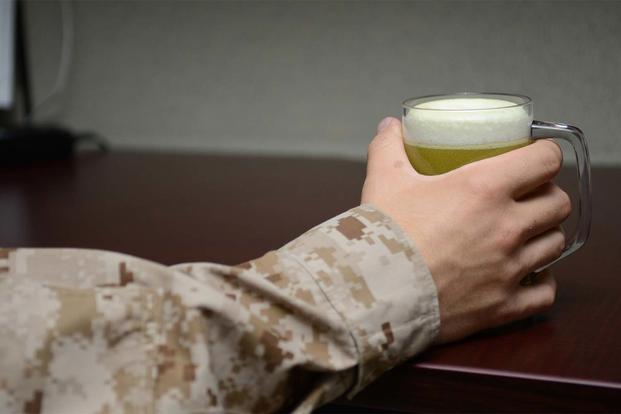"This comes as a surprise," said no one, ever, of a new analysis that finds military members drink alcohol more than workers in any other job.
A review of the Centers for Disease Control and Prevention's survey data from 2013 through 2017 by a behavioral health company has found that troops spend more days a year consuming alcohol than people in any other industry.
They also binge-drink more, imbibing at least four or five alcoholic beverages a day in one sitting at least 41 days a year, the most of any occupation. That's the CDC's definition of binge-drinking, depending on gender. The military personnel surveyed said they binge-drank about a third of the days they consumed alcohol.
Analyzing responses from 27,000 people in 25 industries, Delphi Behavioral Health Group, a Florida-based substance use treatment company, found that members of the military reported drinking alcohol 130 days out of the year, followed by miners, 112 days per year, and construction workers, 106 days. Miners were also second in binge-drinking, doing so 38 days out of the year, and construction workers were third, at 33 days.
At the low end of the spectrum, health care and social assistance workers had a drink roughly 68 days per year.
For those who track the Pentagon's yearly behavioral health surveys and media reports of arrests of service members for crimes ranging from misdemeanors to cases of sexual assault and even murder, the findings support what has been known for decades: the services have a drinking problem, and according to the Delphi report, it appears to be worsening.
The report noted that military personnel in 2014 reported drinking fewer than 100 drinks per year. Now, that number tops 130.
"People in the armed forces typically have ranked the highest every year since 2014," said Ryan Serpico, Delphi's lead researcher. "It's shocking, but not shocking ... [These results] enforce what we already know, but again, they shine a light on this, saying it's a problem and we need to do something about it."
The study was based on the CDC's National Health Interview Surveys from 2013 through 2017, the latest year data was available. As with any study based on survey results, however, it comes with some caveats, including potential bias from respondents who chose to participate and their ability to accurately describe their drinking behaviors the previous years.
Also, of the nearly 27,000 survey participants, only 81 said they were in the military. So the findings could simply reflect the habits of 81 soldiers, sailors, airmen, Marines and Coast Guardsmen who like to drink. A lot.
"I don't know how the CDC executed the surveys," Serpico said, "but when it comes to sample size number, we typically look for 26 respondents in order to make any judgements on the data."
Still, the findings echo the results of a survey frequently conducted by Rand Corp., a Washington-based think tank, for the Defense Department called the Health-Related Behavior Survey, or HRBS. While results from the 2018 survey have not been published, the 2015 survey found that 30 percent of troops reported being binge drinkers, and one in three service members met criteria that indicated they engaged in "hazardous drinking or possible alcohol use disorder."
According to the 2015 HRBS, the percentage of these behaviors was highest in the Marine Corps, where hazardous drinking -- described as drinking that results in negative consequences like risky behavior, missed work days or serious personal problems -- was reported by nearly half the service.
The Air Force had the lowest percentages of these drinking issues, according to the survey.
Excessive drinking has been estimated to cost the Defense Department $1.1 billion per year in lost productivity and medical treatment. It also is thought to result in the loss of roughly 320,000 work days a year and lead to roughly 34,400 arrests per year.
Despite the impact of alcohol use, however, 68% of active duty troops said they perceived the military culture of being supportive of drinking, and 42% said their supervisor doesn't discourage alcohol use, according to the HRBS.
Bri Godwin, a media relations associate with Delphi, said there appears to be acceptance of excessive drinking in the military but added that service members can take control of their habits -- and those of others -- by being mindful.
"There needs to be a conversation on drinking and how much it affects you or someone else. Are you mindful of the consequences -- how is it affecting you mentally, physically and financially. You have to do a personal inventory, see how it's affecting you and determine what you need to do to fix it," she said.
-- Patricia Kime can be reached at Patricia.Kime@Military.com. Follow her on Twitter at @patriciakime.













